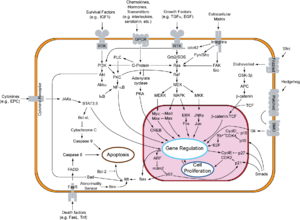

Glycogen synthase kinase-3 beta, (GSK-3 beta), is an enzyme that in humans is encoded by the GSK3B gene.[5][6] In mice, the enzyme is encoded by the Gsk3b gene.[7] Abnormal regulation and expression of GSK-3 beta is associated with an increased susceptibility towards bipolar disorder.[8]
Glycogen synthase kinase-3 (GSK-3) is a proline-directed serine-threonine kinase that was initially identified as a phosphorylating and an inactivating agent of glycogen synthase. Two isoforms, alpha (GSK3A) and beta, show a high degree of amino acid homology.[5] GSK3B is involved in energy metabolism, neuronal cell development, and body pattern formation.[9][10] It might be a new therapeutic target for ischemic stroke.
Homozygous disruption of the Gsk3b locus in mice results in embryonic lethality during mid-gestation.[7] This lethality phenotype could be rescued by inhibition of tumor necrosis factor.[7]
Two SNPs at this gene, rs334558 (-50T/C) and rs3755557 (-1727A/T), are associated with efficacy of lithium treatment in bipolar disorder.[11]
Pharmacological inhibition of ERK1/2 restores GSK-3 beta activity and protein synthesis levels in a model of tuberous sclerosis.[12]
GSK3B has been shown to interact with:

|
PDB gallery
| |
|---|---|
|
1gng: GLYCOGEN SYNTHASE KINASE-3 BETA (GSK3) COMPLEX WITH FRATTIDE PEPTIDE
1h8f: GLYCOGEN SYNTHASE KINASE 3 BETA.
1i09: STRUCTURE OF GLYCOGEN SYNTHASE KINASE-3 (GSK3B)
1j1b: Binary complex structure of human tau protein kinase I with AMPPNP
1j1c: Binary complex structure of human tau protein kinase I with ADP
1o9u: GLYCOGEN SYNTHASE KINASE 3 BETA COMPLEXED WITH AXIN PEPTIDE
1pyx: GSK-3 Beta complexed with AMP-PNP
1q3d: GSK-3 Beta complexed with Staurosporine
1q3w: GSK-3 Beta complexed with Alsterpaullone
1q41: GSK-3 Beta complexed with Indirubin-3'-monoxime
1q4l: GSK-3 Beta complexed with Inhibitor I-5
1q5k: crystal structure of Glycogen synthase kinase 3 in complexed with inhibitor
1r0e: Glycogen synthase kinase-3 beta in complex with 3-indolyl-4-arylmaleimide inhibitor
1uv5: GLYCOGEN SYNTHASE KINASE 3 BETA COMPLEXED WITH 6-BROMOINDIRUBIN-3'-OXIME
|
|
| |||||||||||||||||||||||||||||||||||||||||||||||
|---|---|---|---|---|---|---|---|---|---|---|---|---|---|---|---|---|---|---|---|---|---|---|---|---|---|---|---|---|---|---|---|---|---|---|---|---|---|---|---|---|---|---|---|---|---|---|---|
| |||||||||||||||||||||||||||||||||||||||||||||||
| |||||||||||||||||||||||||||||||||||||||||||||||
| |||||||||||||||||||||||||||||||||||||||||||||||
|
| |
|---|---|
| Activity |
|
| Regulation |
|
| Classification |
|
| Kinetics |
|
| Types |
|